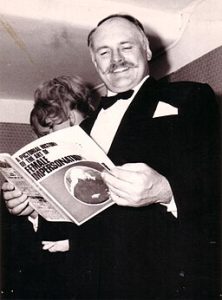
The expressions “headmaster” and “headmistress” have traditionally been used in UK schools for centuries. They obviously refer to a headteacher, whose primary task is the running of a school. Although the phrases are still in use today, particularly in public schools, the imported American term “principal”, is becoming increasing common. However, I think it’s fair to say that for some of us of a particular age, the words “headmaster” and “headmistress” conjure up a particular image from the past, that the term “principal” never will.
Here’s what we consider at Fiveminutesspare.com six-of-the-best (pun fully intended) old-school headteachers from British literature, film and TV:
Wackford Squeers (Nicholas Nickleby)
The fictional character Wackford Squeers was introduced to the literary world by Charles Dickens in his third novel, Nicholas Nickleby (1839). The cruel, one-eyed, authoritarian headmaster runs Dotheboys Hall boarding school for unwanted boys. Squeers treats his pupils with utter contempt, often seeing them go hungry and regularly beaten. However, karma is at play, which sees the evil Squeers eventually get his comeuppance at the hands of Nicholas Nickleby.
There have been at least eleven film and television adaptations of Nicholas Nickleby. The British 1947 film “The Life and Adventures of Nicholas Nickleby” was the first ever on-screen sound adaption. The British movie starred Cedric Hardwick in the titular role and Alfred Drayton as Wackford Squeers. Another major production was the British-American 2002 film “Nicholas Nickleby”, which starred Charlie Hunnam in the lead role and Jim Broadbent as the wicked Wackford Squeers.
Mr Chipping (Goodbye, Mr. Chips)

Photo credit: John Gomez/Shutterstock.com
Mr. Chipping is the main protagonist of the sentimental 1934 novel by James Hilton, “Goodbye, Mr. Chips”. The book tells the story of Mr Chipping, a quiet, shy, unassuming teacher, who arrives at the fictitious Brookfield School in 1870. The book details the career of Mr. Chips, as he is affectionately dubbed by his students, at the school, over a period of some six decades. Chipping is unexpectedly appointed headmaster of the school in 1914. This follows him coming out of retirement, aged 69, due to the shortage of teachers caused by the Great War.
There have been numerous adaptations of “Goodbye, Mr. Chips” for the theatre, radio, television and the big screen. Arguably, the best known is the 1939 Hollywood film version, which stars Robert Donat, in the lead role, and Greer Garson as his wife, Katherine. Donat went on to win the Best Actor Oscar for his portrayal of Mr. Chips. The 1969 British film version of “Goodbye Mr. Chips” was a musical drama, which starred Peter O’Toole and Petula Clark in the lead roles. The film veered away from the original story and also saw Mr. Chips being given a Christian name (Arthur) for the first time. The British TV film adaptation of “Goodbye, Mr. Chips” (2002) sticks closely to Hilton’s original narrative. Character actor Martin Clunes gives a pretty decent performance in the lead role as the tender-hearted Mr. Chips.
Miss Fritton (St Trinian’s)
St Trinian’s was initially a cartoon comic strip that first appeared in Lilliput magazine in 1941. However, its creator and artist, Ronald Searle, was then conscripted into the British Army during WW2. After demob, Searle resurrected his irreverent comic strip that went on to be published between 1946 and 1952. Serale’s St Trinian’s is an anarchic boarding school for girls, where the teachers are mostly degenerates and the pupils are all juvenile delinquents.
The Belles of St Trinian’s is a 1954 British comedy film that was inspired by Searle’s comic strip. In the film, the school’s headmistress, Millicent Fritton, is brilliantly played by the British comedy actor Alastair Sim, who also took on the role of her duplicitous brother, Clarence. Three sequels followed the initial St Trinian’s film: Blue Murder at St Trinian’s (1957); The Pure Hell of St Trinian’s (1960); and The Great St Trinian’s Train Robbery (1966). Sims resurrected his role of Miss Fritton in the 1957 follow-up film. However, the deviant headmistress was played by Irene Handel and Dora O’Brien in the latter films, under different names.
Since the 1960s, a further three St Trinian’s film sequels have been made: The Wildcats of St Trinian’s (1980); St Trinian’s (2007); and St Trinian’s 2: The Legend of Fritton’s Gold (2009). In the two latter films, in homage to the original, Rupert Everett cross-dresses to play headmistress Camilla Fritton, a distant relation of Millicent.
Agatha Trunchbull (Matilda)
Agatha Trunchbull is the main antagonist in Roald Dahl’s 1988 children’s novel “Matilda”. Also known as Miss Trunchbull, or more simply as “The Trunchbull”, she is the fictional headmistress of Crunchem Hall Primary School. A ruthless, cruel, neurotic character, she takes great exception to the young precocious protagonist, Matilda Woodworm. The inspiration for the creation of Miss Trunchbull was reportedly from the real-life “mean and loathsome” Mrs. Pratchett, who owned a sweet shop in Cardiff that Dahl frequented as a child.
Since the publication of the book “Matilda”, it has had a number of adaptions for the stage, screen and radio. In 1990, a British musical version was first adapted for the stage to mixed reviews. A second musical stage version, the award-winning “Matilda the Musical” premiered in November 2010. It opened on Broadway in 2013, and toured in Australia in 2015, to much audience and critical acclaim. In 1996, an American film version of “Matilda” directed by Danny De Vito, saw the setting and nationality of every character changed, except for Trunchbull, who was played by Welsh actress Pam Ferris. The film got reasonable reviews but was not a commercial success. A film adaptation of Matilda the Musical, released in 2022, starred Alisha Weir as Matilda and Emma Thompson as Miss Trunchbull.
Professor James Edwards (Whack-O!)

Photo credit: Chris Shaw/CC BY SA-3.0
Whack-O! was a British sitcom that starred the comic actor Jimmy Edwards as the unscrupulous Professor James Edwards. In the show, he plays the headmaster of the fictional Chiselbury, a second-rate public school. A gambler, a drunk, and a cheat, the devious headmaster terrifies staff and children at the school, alike. The sitcom was written by the famed comedy writing team of Frank Muir and Denis Norden, with a view that Edwards would play the lead role. Whack-O! was originally screened by the BBC from 1956 to 1960 and revived as Whacko! from 1971 to 1972.
With his huge handlebar moustache, Jimmy Edwards’ appearance in Whack-O! was very much that of the archetype old-fashioned headmaster. The central theme of the sitcom was cane-wielding Edwards metering out punishment to his over-privileged pupils. The series quickly became the most popular sitcom of the day. Following the show’s great success, it was adapted for radio and broadcast between 1961 and 1963. The sitcom also inspired the 1960 film spin-off, Bottoms Up, which saw Edwards star again in the headmaster role.
William Wakefield (Carry on Teacher)
In Carry on Teacher (1959), popular entertainer of the day Ted Ray, made his only outing with the 31-film Carry-On franchise. In the film, he starred as William “Wakie” Wakefield, the popular headmaster of Maudlin Street School. The film’s storyline centres around Wakefield’s plan to leave the school at the end of the term. When news leaks out of the headmaster’s imminent departure, the school’s normally well-behaved pupils conspire to halt his exit. Their plan is to sabotage the up-and-coming government inspection of the school. Thus, by ruining Wakefield’s professional reputation, they will significantly diminish his chances of landing a new job.
Like all Carry-On movies, the film’s undemanding plot is simply a vehicle for the delivery of bawdy gags, slapstick comedy and general all round silliness. Nonetheless, Ted Ray puts in a fine performance as the affable, mild-mannered headmaster, making “Carry on Teacher” one of the better films of the Carry-On franchise. However, it almost didn’t turn out that way as British character actor Wilfrid Hyde-White was the initial choice for the role of Wakefield.
Header image credit: J Walters/Shutterstock.com